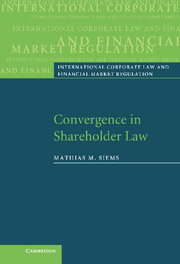Book contents
- Frontmatter
- Contents
- Preface and acknowledgments
- List of abbreviations
- Table of cases
- Table of legislation
- Introduction
- PART I The object and course of the investigation
- PART II The status quo of convergence
- PART III Developmental trends and patterns
- 7 Bases
- 8 Convergence through congruence
- 9 Convergence through pressure
- 10 Future convergences in shareholder law
- 11 Conclusions to Part III
- PART IV Conclusion
- References
- Index
8 - Convergence through congruence
Published online by Cambridge University Press: 15 December 2009
- Frontmatter
- Contents
- Preface and acknowledgments
- List of abbreviations
- Table of cases
- Table of legislation
- Introduction
- PART I The object and course of the investigation
- PART II The status quo of convergence
- PART III Developmental trends and patterns
- 7 Bases
- 8 Convergence through congruence
- 9 Convergence through pressure
- 10 Future convergences in shareholder law
- 11 Conclusions to Part III
- PART IV Conclusion
- References
- Index
Summary
It follows from the dependency of company and securities law and the findings of the public choice theory that the overall socio-political system and the institutional environment decisively influence shareholder law. When these influencing factors come closer together internationally, convergence of law is also possible. Convergence forces are accordingly to be found in general cultural and economic-policy approximations (section I below), the internationalization of the economy (section III below) and approximations of legal culture and shareholder structures (sections II and IV below). These convergence forces are to be seen as part of an overall complex, since they may mutually enhance each other. For instance, economic-policy approximations may encourage the internationalization of business, just as, conversely, economic policy depends on internationalization trends in the economy. Yet, in the future too, no identity of law is to be expected. Even if one may basically presume convergence, path dependencies may continue to account for differences (section V below).
General cultural and economic-policy approximation
Differences in the cultural, political, social and economic environment will continue to exist in the future. However, there is already some approximation, and this is likely to continue further.
‘Clash’ or ‘convergence’ of cultures
Samuel Huntington has claimed that a ‘clash’ of civilizations is to be expected. There will not be a monistic universal culture, but rather modernization without cultural convergence. Cultural paths will continue to exist, and even intensify, since differences will in future be marked not primarily ideologically, politically or economically, but culturally.
- Type
- Chapter
- Information
- Convergence in Shareholder Law , pp. 250 - 296Publisher: Cambridge University PressPrint publication year: 2007
- 1
- Cited by

